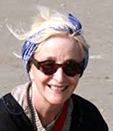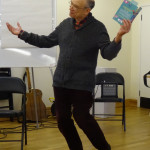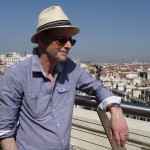Hello Zaro. First question. When did you start writing?
I can’t remember the very first time I wrote a poem, but I remember the one I wrote in first grade in my school in America. I think I was seven or eight. It was called…
x
AS WISE AS THE OWL
AS WISE AS THE OWL
As wise as the owl
that lives in the tree
As busy as a busy as a busy
As a bee
When the leaves go chuckle chuckle
Through the woods
The bees are very busy
Making their goods
The sunflowers by day
Shine in the shade
The roses that bloom at the
Peak of noon
How happy I am
This very day
For Spring is coming
Right my way
x
I think I loved playing with words a lot. I liked the feeling when I heard words that sounded alike in some way but meant different things. Later I learned they were called rhymes. When I said them out loud they seemed to bounce off my tongue and when I heard them they felt ticklish. I also liked words that didn’t really mean anything but sounded fun. They were called non-sense words. One of my favourites was written by an American poet called Eugene Field in the 1890s. It’s called The Fate of the Flimflam…
x
A flimflam flopped from a fillamaloo
Where the pollywog pinkled so pale,
And the pipkin piped a petulant ‘pooh’
To the garrulous gawp of the gale.
‘Oh, woe to the swap of the sweeping swipe
That booms on the hobbling bay!’
Snickered the snark to the snoozing snipe
That lurked where the lamprey lay.
x
I also started collecting all kinds of words in little notebooks. The first words I fell in love with were Native American tribe names. They felt and sounded different and exotic to me; Mohawk, Sioux, Apache, Crow, Navajo. I was infatuated with the romantic names of the motels in the little sea-side resort town where I grew up; Sea Palms, Jolly Roger, Buccaneer, Blue Marlin, Satellite, Shifting Sands, Skylark, etc. I used to ride around with my parents and write these names down. And there were lots of other crazy word lists. I still like making lists. So I have lots of notebooks.
I loved music as a young girl. And when I was growing up there were a lot of great songs on records and my friends and I used to go to each other’s houses and listen to the music and dance. I also discovered poetry then from a book my parents had called; ‘The World’s Best Loved Poems.’ It felt like I had entered a special world when I read that book. I don’t think I really understood what all those words meant, but it didn’t matter at all to me. I loved them anyway. I even memorised them. (I can still recite a few!) I figured it didn’t really matter if I didn’t ‘GET’ everything because it was enough just to have those words near me.
x
Why do you write poetry?
I write poetry for a couple of reasons. One is because they are challenging word puzzles and it’s totally fun for me to work them out. I can sit happily in the middle of a crowded train station or in a park, anywhere really, and tap away on my iPhone writers app or in a notebook and dream away. Another reason I write is because sometimes when I see or feel or hear something special, it makes such an impression on me that I want to remember it forever. So I have to find the best words I can to remember it. And I like to put those words into a poem. I learned that there are lots of different kinds of poems and it’s really really fun to decide which kind of poem I want to do. I guess I write because I can’t really help myself. I just love doing it. More than most other things.
x
There are lots of animals and things from the natural world in your new book Firecrackers. And lots of poems about dogs.
It’s true. I especially like writing about animals and nature. Maybe it’s because I have always felt close to them. But living mostly in towns and cities, I had no idea about just how spell-binding and exciting nature could be. Then, things changed. I moved to a little hill in the countryside and all at once I was face to face with the natural world. I saw things that befuddled and amazed me; owls flying down chimneys, bats rolling around at twilight, mice sitting on the back of toads and wild boars snorting outside my door. I was bewitched watching the entire sky light up during rainstorms and loved seeing how quickly the earth grew mud puddles. These all struck something in me. They felt magical. And wonderful. And when I went to write things, I couldn’t help myself. I was drawn over and over to write about nature. As for dogs. I am totally over-the-moon about dogs. And the best thing is, I live with two wonderful, funny and rascally sheepdogs named Spot and Clementine. So they appear in ‘Firecrackers’ lots of times.
x
Although Firecrackers says it is a book for children, I think it’s also for grown-ups. Do you ever write just for adults?
Yes. I write poetry for adults. I like doing that very much. And I have written plays for adults as well.
x
How long does it take to write a poem?
How long does it take to write a poem?
Every poem is different. Sometimes they pop out of my pen or computer fully formed. But mostly I spend hours and days and even years, fiddling around with the words and ideas till they feel ‘right.’
x
What is the most unusual thing that has inspired you to write a poem?
That’s a good question. I can’t think of any big or unusual thing that inspired me to write a poem. In fact, most of my inspirations come from little events and everyday things; first blossoms in the spring, a sunrise, silly dogs or cats… those kinds of things. My instinct is that if I follow a poetic thread from the little things in life… it often leads me to the big questions about life.
x
What advice would you give to young poets?
I think there are five important things to keep in mind. The first thing is to wear your 3D glasses every day and look at the world with far-seeing magical eyes; from tiny things like bugs and seeds and raindrops, to medium things like dogs and trees and bicycles, to bigger things like the sky and stars and mountains and anything else you can think of. Check out colours and shapes. Notice the ways they all feel and move and sound.This is the important. Every poet needs to learn how to take the time to really and truly LOOK at the world. In every way she or he can.
x
The next thing is tricky. It involves you. The secret you that most people don’t see or know. The same you that makes up amazing tales when you dream at night. What you have to do is to learn to trust that you. Because, when you write a poem, there are lots of ideas that fly around in your brain. And your job, as a poet, is to choose the words that YOU like the best and arrange them together in a way YOU really like. This is called learning to trust yourself.
x
The third thing is not to judge yourself and your words too harshly. Experiment is crucial in poetry. Be brave. Keep trying different words and ideas until you find your own path. It’s not anyone else’s path. It’s all yours.
x
The fourth thing is something you already probably do. Poets need to read all kinds of things with all kinds of words and ideas in them; poems, books, comics, plays, stories, jokes and whatever else you can find. The reason is that these words and ideas find a way into your brain. Then your brain carefully stores them in it’s ‘new word and idea department.’ So when you go looking for cool words and ideas for your poems, presto, your brain clicks into gear and all kinds of exciting new things are right there. Ready and waiting just for you.
x
And the last thing is to have fun. Writing poetry is a magical moment. A moment when you can have a great adventure, imagining and exploring all sorts of new and fantastical things.
x
Very good advice, Zaro. I would add a sixth, and it’s something you’ve already mentioned. Keep a notebook and always have it with you. You never know when you’re going to see something that might inspire a poem.
Are you writing anything at the moment?
x
Yes. I have just finished a book about a little dog hero. The book is called ‘Spot Guevara Guerrilla Dog‘. I love this character. He lives rough on the streets in New York City. He is so adorable and smart. Plus, I really love him because he is based on my wonderful dog whose name is SPOT!

Thankyou Zaro.
WOOF! Have fun writing, everybody!





